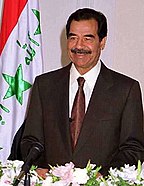The politics of Iraq take place in a framework of a federal parliamentary representative democratic republic. It is a multi-party system whereby the executive power is exercised by the Prime Minister of the Council of Ministers as the head of government, as well as the President of Iraq, and legislative power is vested in the Council of Representatives and the Federation Council.

Politics in the Syrian Arab Republic takes place in the framework of a semi-presidential republic with multiparty representation. President Bashar al-Assad's family and his Arab Socialist Ba'ath Party have remained dominant forces in the country's politics since a 1970 coup.
Elections in Iraq gives information on election and election results in Iraq.

The Arab Socialist Ba'ath Party – Yemen Region is the Yemeni regional branch of the Arab Socialist Ba'ath Party.

The Iraqi Accord Front or Iraqi Accordance Front also known as Tawafuq is an Iraqi Sunni political coalition created on October 26, 2005 by the Iraqi Islamic Party to contest the December 2005 general election. As a large section of Iraq's Sunnis are composed by the populous Kurds, situated in northern Iraq and locally autonomous, the party's members are mostly Arab, and as such, its political efforts have largely been focused on protecting this community's interests as opposed to Iraq's non-Sunni population. In the 2005 election, its platform called for ending the US occupation of Iraq, revision of the new Iraqi constitution, repeal of the de-Ba'athification laws that had cost many Sunnis their government jobs and the restoration of the Iraqi Army, which was dissolved after the US overthrow of Saddam Hussein and which had a Sunni dominated officer corps. Despite this, the party has maintained that it is non-secular, even though the Ba'ath Party contained many prominent Sunnis.

A parliamentary election was held in Iraq on 7 March 2010. The election decided the 325 members of the Council of Representatives of Iraq who would elect the Iraqi prime minister and president. The election resulted in a partial victory for the Iraqi National Movement, led by former Interim Prime Minister Ayad Allawi, which won a total of 91 seats, making it the largest alliance in the Council. The State of Law Coalition, led by incumbent Prime Minister Nouri Al-Maliki, was the second largest grouping with 89 seats.

The State of Law Coalition also known as Rule of Law Coalition is an Iraqi political coalition formed for the Iraqi governorate elections, 2009 by the Prime Minister of Iraq at the time, Nouri al-Maliki, of the Islamic Dawa Party.

De-Ba'athification refers to a policy undertaken in Iraq by the Coalition Provisional Authority (CPA) and subsequent Iraqi governments to remove the Ba'ath Party's influence in the new Iraqi political system. It was considered by the Coalition Provisional Authority to be Iraq's equivalent to Germany's Denazification after World War II. It was first outlined in CPA Order 1 which entered into force on 16 May 2003. The order declared that all public sector employees affiliated with the Ba'ath Party were to be removed from their positions and to be banned from any future employment in the public sector. The policy was highly controversial among US academics, institutions, government, military, and international media and debate outlets. The policy under the Coalition Provisional Authority was officially rescinded on 28 June 2004 as part of the transfer of sovereignty to the Iraqi Interim Government on 30 June 2004. However, elements of the policy continued under the Iraqi Governing Council and later under the elected Iraqi Parliament. Proponents of the policy contend that the policy effectively cleansed Iraqi society of Ba'athist influence, facilitating the creation of a democratic Iraqi government. Critics argue that the policy was not only undemocratic, but also a significant factor in the deteriorating security situation throughout Iraq.

Parliamentary elections were held in Iraq on 20 June 1980, the first since 1958. The elections were contested by around 860 candidates, and saw the Ba'ath Party win 187 of the 250 seats. Voter turnout was approximately 80%.

Parliamentary elections were held in Iraq on 20 October 1984. The elections were contested by 782 candidates, and saw the Ba'ath Party win 183 of the 250 seats.

Parliamentary elections were held in Iraq on 1 April 1989, having originally been scheduled for 31 August 1988, but postponed due to the Iran–Iraq War. The elections were contested by 921 candidates, and saw the Ba'ath Party win 207 of the 250 seats.

Parliamentary elections were held in Iraq on 24 March 1996. The elections were contested by 689 candidates, although 30 MPs were appointed to represent Iraqi Kurdistan. The result was a victory for the Ba'ath Party, which won 161 of the 250 seats. Voter turnout was reported to be 93.5%.

The Arab Socialist Ba'ath Party, also referred to as the pro-Iraqi Ba'ath movement, is a Ba'athist political party which was headquartered in Baghdad, Iraq until 2003. It is one of two parties which emerged from the 1966 split of the original Ba'ath Party.

The National Arab Socialist Ba'ath Party – Yemen Region is a political party in Yemen. The party is the Yemeni regional organisation of the Iraq-led Ba'ath Party. The secretary of the party in Yemen is Dr. Qassem Salam Said. Abdulwahid Hawash serves as the deputy secretary. The party publishes the newspaper Al-Ehyaa Al-'Arabi.

The Socialist Arab Lebanon Vanguard Party is a political party in Lebanon. The party was led by Abd al-Majid al-Rafei until his death in July 2017. It is the Lebanese regional branch of the Iraqi-led Ba'ath Party. The party held its second congress in October 2011. Founders of the party included Dr. Abd al-Majid al-Rafei, Jihad George Karam, Rafiq Nasib Alfaqiya, Karam Mohamed Assahli, Hani Mohamed Shoiab, Ammar Mohamed Shabli, Hassan Khalil Gharib and Asaf Habin Alharakat.

The Jordanian Arab Socialist Ba'ath Party (JASBP), previously known as the Arab Socialist Ba'ath Party – Jordan Region ' is a political party in Jordan. It is the Jordanian regional branch of the Iraqi-led Ba'ath Party.

The National Vanguard Party, is a political party in Mauritania. It is the Mauritanian regional branch of the Iraqi-led Arab Socialist Ba'ath Party.
The Arab Liberation Movement was a Syrian political party founded on 25 August 1952 by the President of Syria Adib Shishakli, during his government was the only legal party in Syria until 1954.

Governorate or provincial elections were held in Iraq on 20 April 2013, to replace the local councils in the governorates of Iraq that were elected in the Iraqi governorate elections of 2009. Elections took place in 12 of Iraq's 18 governorates. Elections didn't take place in the 3 governorates forming the Kurdistan Region or Kirkuk, Anbar, or Ninevah, meaning that a total of 378 provincial council seats were up for election.
The Party of the Hungarian Interest, was a far-right Hungarian radical nationalist political party between 1993 and 2005.













